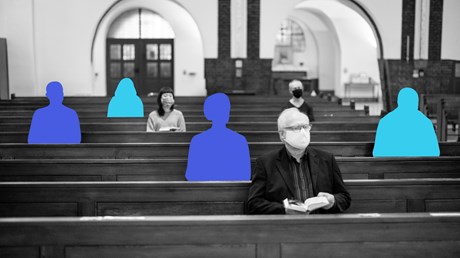Recent research paints a grim picture for local congregations. But it also highlights opportunities.

During his 21 years as lead pastor of Grace Church in Greenville, North Carolina, Mike Meshaw has seen many people come and go in the transient area that is home to East Carolina University.
Before COVID-19 shut things down in March 2020, the independent evangelical church averaged about 220 people a week. Almost two years after the church briefly suspended in-person services because of COVID-19, he says they are averaging about 150 people a week.
“Most of the people who are not attending [services] are afraid,” he told us. “They are uncomfortable being around crowds.”
The church voluntarily halted in-person worship early in the pandemic, but it was not long before the leadership began hearing from members who missed their church family. “More than 50 percent of our church pushed us to reopen,” Meshaw noted.
As soon as possible, they reopened—and sooner than other churches in the area. That decision turned out to be a positive thing for the church.
“Our people still take precautions, social distancing, and masks—voluntarily,” Pastor Meshaw stated, including canceling a service when necessary. “But we stay open.”
While the church has fared well, the pastor is concerned about the impact of the ongoing pandemic on his congregation, especially during this recent surge in cases.
“One positive test and you put the information out there, and the fear multiplies into a monster, and people get shaken by it,” he said. “My concern is this wear and tear on people’s emotions. How long will they be able to sustain that before they just get frustrated? Some have.”
Other churches have had to deal with declines in attendance and tensions in the ...
from Christianity Today Magazine
Umn ministry


.gif)

.gif)
.gif)
